虚拟语气
英语中三种虚拟语气
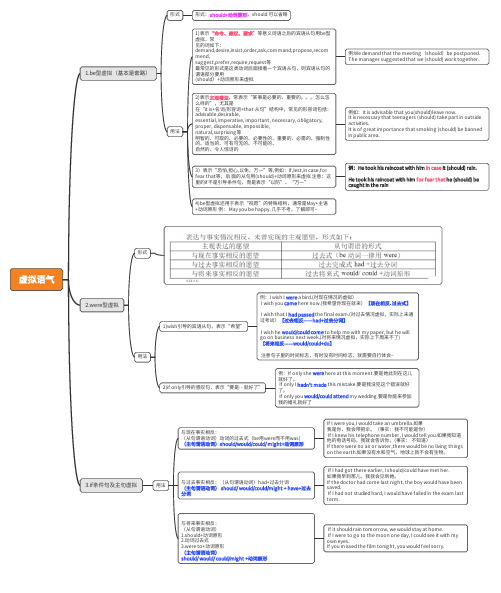
虚拟语⽓1.b e型虚拟(基本是套路)2.w ere型虚拟3.if条件句及主句虚拟形式⽤法⽤法1)表⽰“命令、建议、要求”等意义词语之后的宾语从句⽤b e型虚拟,常⻅的词如下:d e m an d,d es i re,i ns i s t,or d er,as k,co mm an d,p ro p ose,reco mm en d,sugges t,p re f er,re q u i re,re q ues t等最常⻅的形式是这类动词后⾯接着一个宾语从句,则宾语从句的谓语部分要⽤(s h oul d)+动词原形来虚拟2)表⽰主观看法,常表⽰“某事是必要的、重要的。
怎么怎么样的”,尤其是在“it i s+名词/形容词+th a t 从句”结构中,常⻅的形容词包括:a dvi sab le,d es i ra b le,essen ti al, imp era tiv e, imp or t an t, necessar y, o b l i ga t or y,p ro p er, di s p ensa b le, imp oss ib le,na t ural,sur p r i s i ng等明智的、可取的、必要的、必要性的、重要的、必需的、强制性的、适当的、可有可⽆的、不可能的、⾃然的、令⼈惊讶的3)表⽰“恐怕,担⼼,以免,万一”等,例如:if,les t,i n case,f orf ear th a t等,后 ⾯的从句⽤(s h oul d)+动词原形来虚拟 注意:这⾥的if不是引导条件句,⽽是表⽰“以防”、“万一”4)b e型虚拟还⽤于表⽰“祝愿”的特殊结构,通常是M a y+主语+动词原形 例: M a y y ou b e h a ppy. ⼏乎不考,了解即可~与现在事实相反:(从句谓语动词)动词的过去式(b e⽤w ere⽽不⽤w as)(主句谓语动词)s h oul d/w oul d/coul d/ mi g ht+动词原形与过去事实相反:(从句谓语动词)h a d+过去分词(主句谓语动词) s h oul d/ w oul d/coul d/mi g ht + h a v e+过去分词与将来事实相反:(从句谓语动词)1.s h oul d+动词原形2.动词过去式3.w ere t o+动词原形(主句谓语动词)s h oul d/ w oul d/ coul d/mi g ht +动词原形形式:s h oul d+动词原形,s h oul d 可以省略If it s h oul d ra i n t o m orro w, w e w oul d s t a y a t h o m e.If I w ere t o go t o th e m oon one d a y, I coul d see it with myo w n e y es.If y ou mi sse d th e fi l m t on i g ht, y ou w oul d f eel sorr y.If I h a d go t th ere earl i er, I s h oul d/coul d h a v e m e t h er.如果我早到那⼉,我就会⻅到她。
虚拟语气的用法及例子
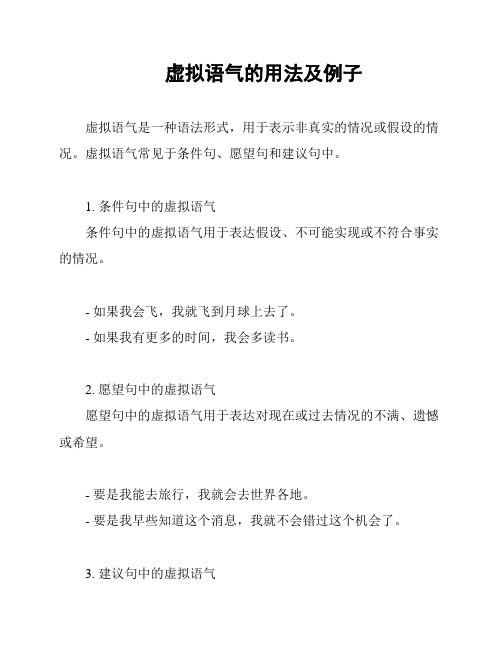
虚拟语气的用法及例子
虚拟语气是一种语法形式,用于表示非真实的情况或假设的情况。
虚拟语气常见于条件句、愿望句和建议句中。
1. 条件句中的虚拟语气
条件句中的虚拟语气用于表达假设、不可能实现或不符合事实的情况。
- 如果我会飞,我就飞到月球上去了。
- 如果我有更多的时间,我会多读书。
2. 愿望句中的虚拟语气
愿望句中的虚拟语气用于表达对现在或过去情况的不满、遗憾或希望。
- 要是我能去旅行,我就会去世界各地。
- 要是我早些知道这个消息,我就不会错过这个机会了。
3. 建议句中的虚拟语气
建议句中的虚拟语气用于表达对某种行动或情况的建议、要求或命令。
- 尽量少吃甜食,要不然你会发胖的。
- 要是你需要帮助,尽管告诉我。
虚拟语气通过使用虚拟动词和特殊的句子结构来表达。
在中文中,通常使用“如果……就……”、“要是……就……”、“如果能……就……”等句式来表示虚拟语气。
需要注意的是,虚拟语气在口语和书面语中的使用有所不同。
在口语中,虚拟语气的使用相对较少,而在正式的书面语或文学作品中,虚拟语气的使用相对较多。
希望本文对你理解和运用虚拟语气有所帮助!。
虚拟语气讲解
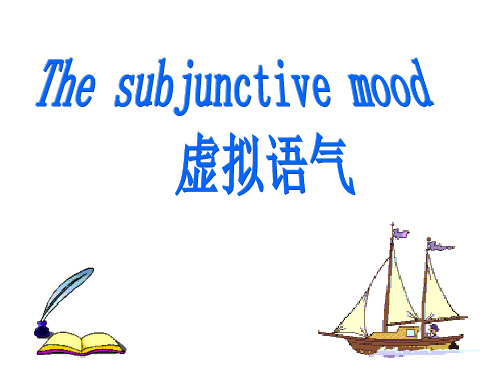
What would have happened, _____ as far as the river bank? (01 上海) A. Bob had walked farther B. if Bob should walk farther C. had Bob walked farther D. if Bob walked farther
C
二、虚拟语气在名词从句中的运用 (1)用于宾语从句 1、wish 后面的宾语从句中。 一般用虚拟语气,表示一种不可能实现的愿望。其谓 语动词形式为:
表现在
表过去
过去时
过去完成时
表将来 would, might, could+动词原形 I wish (that) I were a bird.
I wish (that) I had seen the film last night. I wish (that) I would\could go.
虚拟语气
虚拟语气的概念
虚拟语气是一种特殊的动词形式,一是用来
表示说话人所说的话不是一个事实,而是一 种假设、猜测、怀疑等(在条件从句中或让步 状语从句中);一是表示说话人的愿望、要求、 命令、建议等 (在宾语从句、表语从句、同位 语从句)。
虚拟语气在 在条件从句中
虚拟条件句
与现在 事实相 反的假 设 与过去 相反的 假设 与将来 相反的 假设
2. 在某些动词后的宾语从句中需用should+动词原形的 虚拟语气形式。“should”可以省略。 常见的动词有: 一个坚持insist; 两个命令order, command ; 三条建议suggest , advise, propose; 四项要求demand, request, require, ask; 另外还有prefer
虚拟语气

1.过去式 过去式 would/could/should 将来 2. should+ V.(原) 原 /might +V.(原) 原 3. were to do
4. It’s (about/high) time +that
过去时(did/were) 过去时 Should(不省) +V.
你该走了。 你该走了。
It’s high time that you went. It’s high time that you should go.
我们该去
It’s time that we went to bed.
★
现在: 现在:过去时 3. as if /though + 从句 过去: 过去: 过去完成时
★ ★
She loves the baby as if it were her own son. I remember the whole thing as if it had
happened yesterday.
3) What ____ last night if you ____ to do your B washing? A. would you do, hadn’t had B. would you have done, hadn’t had C. would you do, didn’t have D. would you have done, didn’t have 4) If I had hurried, the train ____ . D A. would catch C. had caught B. would have caught D. would have been caught
虚拟语气英语知识点总结

虚拟语气英语知识点总结一、虚拟语气的概念。
虚拟语气是一种特殊的动词形式,用来表示说话人所说的话不是一个事实,而是一种假设、愿望、怀疑、猜测或建议等。
二、虚拟语气在条件句中的用法。
1. 与现在事实相反的虚拟条件句。
- 结构:从句(If + 主语+ 动词的过去式(be动词一般用were)),主句(主语+ would/should/could/might+动词原形)。
- 例如:If I were you, I would study harder.(如果我是你,我会更努力学习。
实际上我不是你)2. 与过去事实相反的虚拟条件句。
- 结构:从句(If+主语+had+过去分词),主句(主语+would/should/could/might + have+过去分词)。
- 例如:If he had taken my advice, he would have passed the exam.(如果他听了我的建议,他就会通过考试了。
实际上他没听建议,也没通过考试)3. 与将来事实相反的虚拟条件句。
- 结构:从句(If+主语+动词的过去式/should+动词原形/were to+动词原形),主句(主语+would/should/could/might+动词原形)。
- 例如:If it rained tomorrow, we would stay at home.(如果明天下雨,我们就会待在家里。
明天是否下雨还不确定,但这是一种假设情况)- 或者If he should come tomorrow, I would tell him the news.(如果他明天来,我就会告诉他这个消息)- 以及If I were to see her tomorrow, I would give her the book.(如果我明天见到她,我就会把书给她)三、虚拟语气在宾语从句中的用法。
1. wish后的宾语从句。
- 表示与现在事实相反的愿望,从句谓语动词用过去式(be动词用were)。
虚拟语气
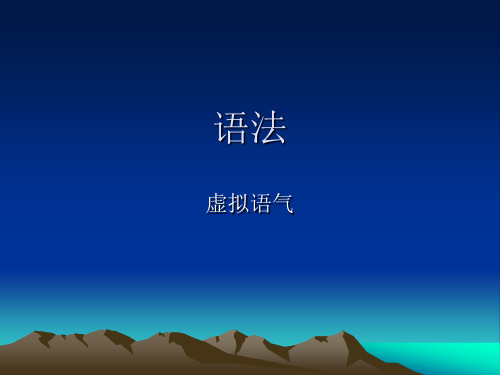
虚拟语气
何为虚拟语气?
• 虚拟语气是一种动词形式,表示说话人的 一种愿望、假设、怀疑、猜测、建议等含 义,它所表示的含义不是客观存在的事实。 如: • If I were you, I‘d take them away.如果我是 你的话,我就会带走他们。 • He suggested that our class should be divided into five groups.他建议说我们班应 该分为五个小组。
虚拟语气在状语从句中的用法
• •
• • •
A 在条件状语从句中的用法:虚拟语气在表示条件的状语从句中的使用最常见。
表示与现在事实相反的假设:若表示与现在事实相反的假设,条件从句用一般过去时, 主句中用“would/should/might+动词原形”的形式:If my brother were here, everything would be all right.要是我哥哥在这,一切都没有问题了。 表示与过去事实相反的假设:若表示与过去事实相反的假设,条件状语从句中用过去完 成时,主句中用谓语动词“should/would/could/might +have done”的形式:If I had set off a little earlier, I would have caught the train. 表示与将来事实相反的假设:若表示与将来事实的假设,条件状语从句中用一般过去时、 should+动词原形或were to+原形,主句中谓语动词用should/would/could/might+动词原形的形式: If it were fine tomorrow, I would go shopping.如果明天天气好,我就去买东西。 错综时间条件句:错综时间条件句指条件状语从句表示的动作发生的时间不一致,即条 件从句表示与过去事实相反,主句表示与现在事实相反;或条件从句表示与现在事实相反,主句表 示真实情况:If he had set out earlier, he would be home tomorrow.如果他早点出发的话,现在就 已经到家了。 含蓄条件句:有时为了表达的需要,在虚拟语气中并不总是出现if引导的条件句,而通 过其他手段如介词(短语)with ,without ,but for,副词otherwise,或其他从句来表示虚拟语气的条件: What should I do with a million dollars? 如果你有一百万美元,你会怎么做? We could not have finished the work ahead of time without your help.如果没有你的帮助,我们不会提前完成任务。 But for the rain, we could have held the sport meet.如果不是下雨的话,我们就开运动会了。
十大虚拟语气词

十大虚拟语气词一、insist1、含义:vt. 坚持;坚决主张,vi. 坚持;强调。
2、用法insist的基本意思是“坚持”,常用于坚持意见、看法、主张等。
insist既可用作及物动词,也可用作不及物动词。
作及物动词时,不能用名词、代词或动词不定式作宾语,只能接that引导的从句。
若指尚未发生的动作,从句谓语常用虚拟语气(should+动词原形或直接用动词原形);若表示一个已发生的动作或已存在的状态时,从句谓语多用陈述语气。
that有时可以省略。
insist用作不及物动词时,其后常须加介词on〔upon〕,然后接名词、代词或动名词。
该动名词前可加物主代词或名词、人称代词的宾格形式作其逻辑主语,该动名词的否定形式是在其前直接加not。
He insisted that he had done right.他坚决认为自己做对了。
They insist that I stay there for supper.他们坚决要求让我留下吃晚饭。
二、command1、含义:n. 命令;指挥;掌握;[计算机] DOS命令: 引用辅助命令处理器,v. 命令;指挥;掌握;博得。
2、用法command用作动词是正式用语,表示“命令,要求”时,一般不用作进行时;其后可接名词或代词作宾语,接带动词不定式的复合结构和that从句时,从句中的谓语动词应用虚拟式,即“(should+)动词原形”。
command在书面语体中可以引出直接引语,作“命令道”或“用命令的口气说道”解。
He growled a command to her to stop.他咆哮着命令她停下来。
The company commander roared his command.连长高声发布命令。
三、suggest1、含义:vt. 建议;暗示;使想起;表明;要求。
2、用法suggest的基本意思是“建议”“提议”,还可表示“暗示,表明”“使想起”等。
suggest作“建议”“提议”解后接that从句作宾语时,从句中的谓语动词要用虚拟式; 作“表明,暗示”“使想起”等解时,从句中的谓语动词可用陈述式。
虚拟语气语法总结
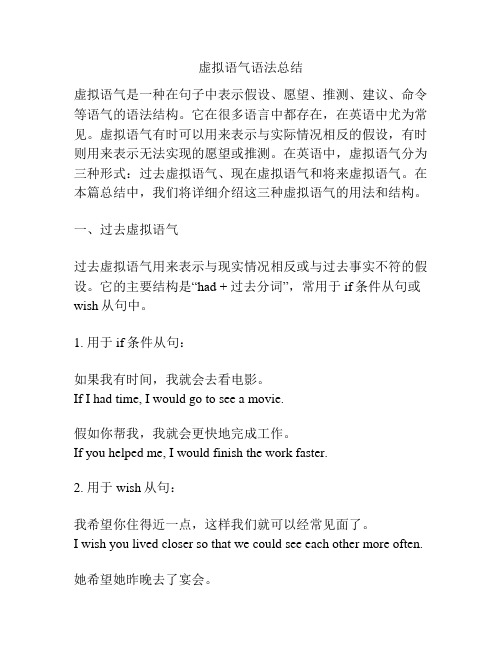
虚拟语气语法总结虚拟语气是一种在句子中表示假设、愿望、推测、建议、命令等语气的语法结构。
它在很多语言中都存在,在英语中尤为常见。
虚拟语气有时可以用来表示与实际情况相反的假设,有时则用来表示无法实现的愿望或推测。
在英语中,虚拟语气分为三种形式:过去虚拟语气、现在虚拟语气和将来虚拟语气。
在本篇总结中,我们将详细介绍这三种虚拟语气的用法和结构。
一、过去虚拟语气过去虚拟语气用来表示与现实情况相反或与过去事实不符的假设。
它的主要结构是“had + 过去分词”,常用于if条件从句或wish从句中。
1. 用于if条件从句:如果我有时间,我就会去看电影。
If I had time, I would go to see a movie.假如你帮我,我就会更快地完成工作。
If you helped me, I would finish the work faster.2. 用于wish从句:我希望你住得近一点,这样我们就可以经常见面了。
I wish you lived closer so that we could see each other more often. 她希望她昨晚去了宴会。
She wishes she had gone to the party last night.二、现在虚拟语气现在虚拟语气用来表示与现实情况相反或不太可能实现的愿望、建议、要求等。
它的主要结构是“should + 动词原形”或“were + to + 动词原形”。
1. 用于虚拟的愿望:如果我是你,我会马上辞职。
If I were you, I would quit my job immediately.(“were”表示与现实情况相反的假设)我希望你明白我的意思。
I wish you understood what I mean.(“understood”表示与现实情况不符的愿望)2. 用于虚拟的建议和要求:你应该尽早去看医生。
- 1、下载文档前请自行甄别文档内容的完整性,平台不提供额外的编辑、内容补充、找答案等附加服务。
- 2、"仅部分预览"的文档,不可在线预览部分如存在完整性等问题,可反馈申请退款(可完整预览的文档不适用该条件!)。
- 3、如文档侵犯您的权益,请联系客服反馈,我们会尽快为您处理(人工客服工作时间:9:00-18:30)。
虚拟语气
虚拟语气表示一种假设的情况,或一种主观的愿望,即动词所表示的动作或状态并非事实,或不可能实现。
英语虚拟语气的形式有下列几种:
一、与现在事实相反
If I were you, I would give up drinking immediately.
二.与将来事实相反
If I were to see her tomorrow, I would tell her thetruth.
If you went there next time, you would see what I mean.
三、与过去事实相反
四、虚拟语气的特殊用法。
1、省掉if的条件从句结构:
Had you asked me, I would have told you. =If you had asked me, I would have told you.
2、有时条件从句中的动作和结果从句中的动作发生的时间不一致,如:
If he had followed the doctor’s advice, he would be quite all right now.
If I were you, I would have gone home.
五、虚拟语气的其他用法
He suggested that they (should ) stop smoking.
上述动词的名词形式出现时,that 引导的从句仍用虚拟语气。
He made a request that they (should ) stop smoking.
如果that 引导的从句所表达的内容是事实,也可用陈述语气。
He insists that he is right.
It is right that you should have done your homework.
I wish I were a pop singer. (=I am sorry I am not a pop singer..)
I wish I had never stopped teaching. (=I am sorry I stopped teaching.)
I wish they’d let us get some sleep.
注意:wish与hope接宾语从句的区别在于:hope表示一般可以实现的希望,宾语从句用陈述语气。
wish表示很难或不大可能实现的希望,宾语从句用虚拟语气。
试比较:
(1)We hope they will come,(We don’t know if they can come.)
(2)We wish they could come,(We know they are not coming.)
4、as if, as though, would(had) rather(that)引导的从句须用虚拟语气,如:
He acts as if nothing had happened.
I would rather you didn’t tell him.
5、It’s (high) time that…+动词过去式或should+动词原形,如:
It’s time (that) you had a hair cut.
It’s high time (that) we took some action.
虚拟语气专项练习
1、If I you, I would go by plane. Flying is much faster.
A. be
B. was
C. were
D. am
2、I do not think those people are really English. If they were, they speak with French accents.
A. don't
B. will not
C. mustn't
D. wouldn't
3、The secretary suggested that they ________ the men in at once.
A. had brought
B. should have brought
C. brought
D. bring
4、If Jone tomorrow, what would you do?
A. were not to come
B. will not come
C. would not come
D. had not come
5、“She didn't ask me, so I didn't help her?”
“You mean to say that , you would've helped her ?”
A. if she asked you
B. if she were to ask you
C.had she asked you C. were she to ask you
6. If he _______ to the teacher carefully, he _______ the answer to the problem now.
A. had listened, would have known
B. listened, would know
C. listened, would have known
D. had listened, would know
7. If I had not been so busy yesterday, I _______ your birthday party.
A. attended
B. had attended
C. would attend
D. would have attended
8. It is high time we _______ up our results.
A. sum
B. summed
C. will sum
D. would sum
9.You are late. If you _____ a few minutes earlier, you _____ him.
A. come; would meet
B. had come; would have met
C. come; will meet
D. had come; would meet
10.If it _____ another ten minutes, the game would have been called off.
A. had rained
B. would have rained
C. have seen
D. rained
11.If I _____ enough money, I would have bought a much bigger car.
A. possessed
B. owned
C. had
D. had had
12.We might have failed if you _____ us a helping hand.
A. have not given
B. would not give
C. had not given
D. did not give。
